Mentor and Student: Back-to-Back Awards for Efforts on Social Conversation and Change
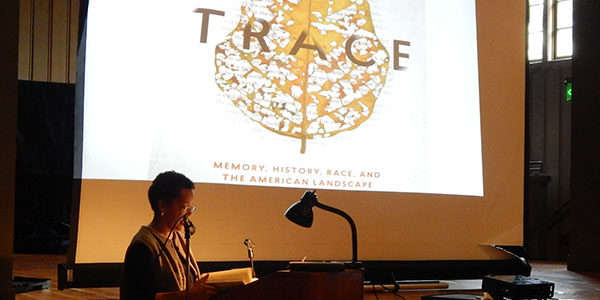
Lauret Savoy at the FOUNDATIONS FOR CHANGE: Thomas I. Yamashita Prize ceremony. Photo courtesy of UC Berkeley
Mount Holyoke College Professor of Environmental Studies Lauret Savoy was presented with the American Book Award from the Before Columbus Foundation in San Francisco on October 30. Her recent book, Trace: Memory, History, Race, and the American Landscape, explores ancestral, cultural, archeological, and personal history while demonstrating how both a person and a terrain become marked by experiences.
At the ceremony Savoy joined the ranks of impressive past recipients, including Toni Morrison, Quincy Troupe, Leslie Marmon Silko, Louise Erdrich, and Jamaica Kincaid—all of whom were recognized for their contributions to outstanding literary achievement from the spectrum of America’s diverse literary community. In attendance for this special occasion was Savoy’s former student, Aileen Suzara ’06.
“My heart glowed with pride seeing Lauret step up to the stage,” Suzara said. “I could sense the way her quiet, powerful, and poetic voice filled the room and landed deeply with the audience. It was a voice I remembered from the classroom. . . . [I was struck with] a gratitude that this was a mentor, teacher, and respected friend I had known ever since I was a teen.”
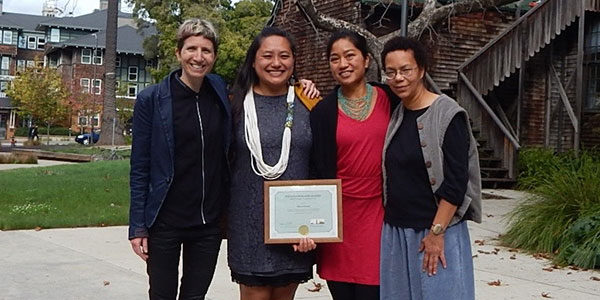
From left to right: Rosalie Z. Fanshel, program manager with the Berkeley Food Institute; Mari Rose Taruc, chair of the board of directors of the Filipino/American Coalition for Environmental Solidarity; Aileen Suzara ’06; and Mount Holyoke Professor Lauret Savoy. Photo courtesy of UC Berkeley
The following day Savoy delivered the keynote address at a ceremony where Suzara was being presented with the FOUNDATIONS FOR CHANGE: Thomas I. Yamashita Prize. Sponsored by the Institute for the Study of Societal Issues at the University of California, Berkeley, the Yamashita Prize is given to an outstanding young social change activist/scholar whose work transforms the existing social landscape and serves as a bridge between the academy and the community. “Aileen has been doing this,” Savoy said, “since we worked together at Mount Holyoke College as student and teacher, as teacher and student. To be in such relation is never one way—it’s always an exchange.”
Suzara, an alumna of UC Berkley’s Masters in Public Health Nutrition program, was honored for her work at the Berkeley Food Institute, where she took a leadership role in their community engagement program, which aims to build bridges between the university and the broader food and agriculture community. A land- and kitchen-based educator and public health nutritionist, Suzara also has spent much of the last decade working on health inequities facing her fellow Filipino Americans—including diabetes, hypertension, and cardiovascular disease—largely by helping to promote the growing and sharing of healthy food.
How we show we believe in someone, take a chance on them, listen to them, reflect them, can truly have ripple effects that continue over the years.Aileen Suzara ’06
A community garden Suzara started in collaboration with Filipino Advocates for Justice was just a seed of an idea when she was in Savoy’s class as an undergraduate in 2005. During the Yamashita Prize ceremony, she told the audience about the term paper in which she proposed just such a project and on which Savoy had written, “This proposal is clear and makes good practical sense. Why not do it?”
“I am terrible at saving paperwork,” Suzara said afterward. “But I held onto that.”
“As a young woman of color who often felt alienated in the environmental field, I looked to Lauret’s path for inspiration,” she said. “Her way of inviting in stories of place, culture, and home as part of how we understand ‘environment’ created a space of belonging. It sparked my curiosity and activism for land and environmental justice at a critical time. By encouraging our stories, and a curriculum that featured multicultural voices on the environment, Lauret pushed me to seek more deeply my Filipino roots and ancestral connections to land and place.”
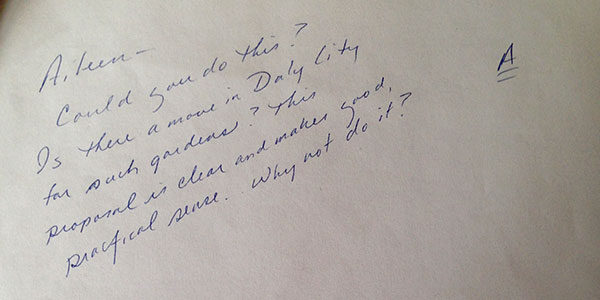
The actual note from Professor Savoy to Suzara, encouraging her idea of a community garden. Courtesy of Aileen Suzara
At the award ceremony, Savoy spoke of Suzara’s time at Mount Holyoke: “So powerful was Aileen’s voice then that I invited her to contribute an essay to the book The Colors of Nature: Culture, Identity, and the Natural World. Aileen’s piece is among the best in this collection that helps us recognize how crucial it is to think and write across threads of identity that are around and within us—those defined from within and those imposed from without—to understand more fully our place on Earth and our connections with each other.”
“Lauret puts great intention into her words, and I think that is why she shone as both a mentor/teacher and as a storyteller,” Suzara said. “How we show we believe in someone, take a chance on them, listen to them, reflect them, can truly have ripple effects that continue over the years.”
—By Anne Pinkerton
December 21, 2016







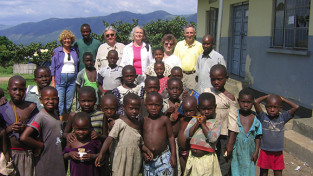
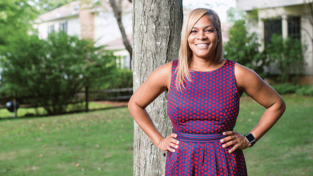
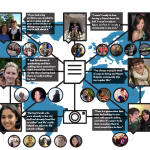
Leave a Reply